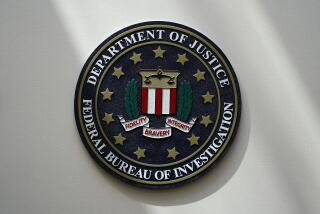U.S. Ends Trade Center Bombing Case : Courts: Prosecution asks jury to convict four defendants for committing the ‘worst terrorist act’ in U.S. history.
- Share via
NEW YORK — In closing arguments in the World Trade Center bombing case, a federal prosecutor told jurors Monday that the conspiracy to bomb the twin towers began five months before the blast, when one of four defendants arrived in the United States carrying bomb-making manuals and anti-American and anti-Jewish literature.
Concluding the government’s 18-week case, prosecutor Henry DePippo asked the jury to convict all the foreign-born defendants for what he called “the worst terrorist act” in the nation’s history. The explosion killed six people, injured more than 1,000 others and disabled for a month one of the world’s best-known landmarks.
Defense attorneys are scheduled to make their presentations todayin the courtroom of U.S. District Judge Kevin T. Duffy. The jury is expected to begin its deliberations this week.
DePippo told jurors that the government’s presentation had been a lengthy one involving so many witnesses--more than 200--”because no one witness could tell the whole story.”
Gesturing to the defendants, he said: “These men not only left chaos and horror in their wake, they also left behind some important clues. Now it’s time to put these pieces together.”
The government has attempted to persuade the jury that the plot began when Mohammad Ahmad Ajaj arrived at New York’s John F. Kennedy Airport in September, 1992, describing himself as “a Palestinian protester” and seeking political asylum.
Immigration authorities found that he had used an altered Swedish passport and had employed a string of false identities.
In addition, the prosecutor said, authorities discovered among his possessions bombing manuals, videos and handwritten notes indicating that he had received weapons and explosives training.
Ajaj was jailed for immigration violations, DePippo said. An associate, Ramzi Ahmed Yousef, who had entered the country on the same flight, met days later in New Jersey with two other defendants, Mohammed A. Salameh and Mahmud Abouhalima, the prosecutor said.
Yousef, who has been declared a fugitive, left the country only hours after the bombing--before authorities had linked him to the act.
DePippo said the government’s evidence showed that Salameh, with whom Yousef shared an apartment, opened a joint bank account with the fourth defendant, Nidal Ayyad, a chemical engineer.
“Salameh and Ayyad opened an account with $8,500 before withdrawing most of it in cash,” he said. “They then began making a slew of phone calls to chemical companies in order to buy chemicals.”
In one instance, the men used 36 $100 bills to purchase ingredients for a 1,200-pound bomb--the one Salameh and Abouhalima drove into the trade center’s underground garage in a rented van, DePippo said.
Abouhalima, whom federal investigators labeled the “field general” of the plot, was linked to the conspiracy through dozens of telephone calls among the defendants, the prosecutor said.
However, federal authorities never were able to trace the source of the funds deposited by Salameh and Ayyad in a Jersey City bank.
Computer disks found in Ayyad’s office identified him as the author of a letter sent to New York newspapers claiming that, unless the United States stopped supporting Israel, more terrorist bombings would occur.
If convicted of conspiracy in the bombing, the defendants could be sentenced to life imprisonment.
A second trial of 15 alleged high-ranking conspirators, including a blind Egyptian sheik, is scheduled to begin in the fall. They have been indicted on charges of helping plan the World Trade Center explosion as well as the intended destruction of the United Nations building and the Lincoln and Holland tunnels connecting New York with New Jersey.
More to Read
Sign up for Essential California
The most important California stories and recommendations in your inbox every morning.
You may occasionally receive promotional content from the Los Angeles Times.










